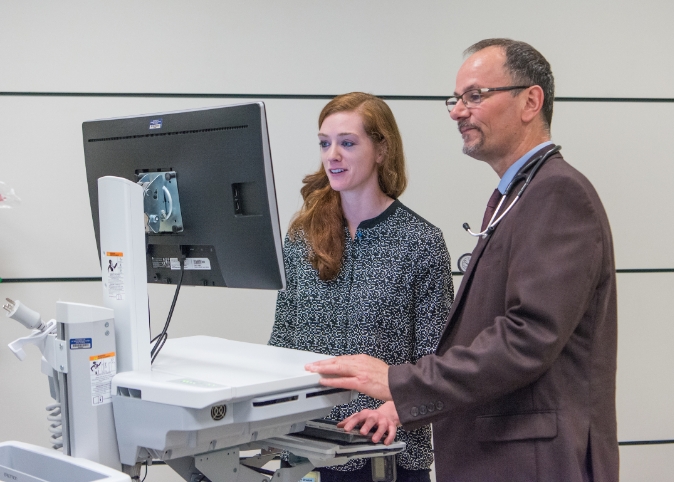Research
Our faculty and researchers are at the forefront of research and have expertise in a range of areas, from health equity to chronic diseases.

Research

Research Expertise
We conduct research aimed at giving health care providers, consumers and policymakers the information they need for informed decision making, including:
- Physician-patient communication
- Addressing social determinants of health
- Chronic illness care
- Substance misuse
- Opioid pharmacoepidemiology
- Screening and preventive services
- Medical education and workforce development
Our faculty and researchers are actively engaged in cutting-edge research projects that aim to improve patient outcomes, inform clinical practice, and shape healthcare policy. Explore our current research projects and learn more about the innovative work being conducted by our team.
This Centers for Disease Control and Prevention (CDC) funded project will use population data to examine factors leading to co-prescriptions of opioids and sedative medications which pose higher risk of overdose.
Stigma against those who use substances, from healthcare professionals, family, friends, the general community, and even themselves, is considered to be a major barrier to successful engagement in treatment. This project focuses on how to measure stigma among substance users and how to change it.
EnROUTE is a mixed methods study designed to integrate patient, provider, and community perspectives with epidemiologic data to address transportation insecurity in patients with end stage kidney disease (ESKD) treated with in-center hemodialysis.
-
Hot Topics in Kidney Health podcast explores study on patient transportation
What does it mean to design a study with patients, not just for them, and why does that shift matter for kidney care outcomes? Na’amah Razon answered these questions and more in the Hot Topics in Kidney Health podcast with the National Kidney Foundation (NKF). Razon is a physician and assistant professor in the Department of Family and Community Medicine.
-
Dean’s Excellence Awards recognize outstanding achievements
Joshua Fenton, a professor and vice chair of research in the Department of Family and Community Medicine, was recognized for his dedication to mentoring aspiring researchers. He received the 2024 Dean’s Award for Excellence in Mentoring from the UC Davis School of Medicine.
-
Report aims to revitalize declining primary care in the U.S.
The UC Davis Department of Family and Community Medicine hosted the Revitalizing Primary Care (Rev PC) Summit in October 2024 to discuss the crisis in primary care in the U.S. In June 2025, a 30-member expert panel that was first convened at the summit released its recommendations. The 50-page report made seven recommendations to improve the state of primary care.
-
Caring for people experiencing homelessness
A qualitative study found that people experiencing homelessness often delay seeking care due to past dehumanizing healthcare encounters, while street medicine teams help restore trust through respectful, patient‑centered engagement. Department of Family and Community Medicine faculty Alicia Agnoli and Na'amah Razon were coauthors on this BMJ Public Health study with family medicine resident Ren Bruguera.
-
Screening for breast cancer: Evidence report and systematic review
New guidance recommends all women get screened for breast cancer every other year starting at age 40. The recommendation issued by the United States Preventive Services Task Force (USPSTF) comes alongside a new systematic evidence review and modeling study published in JAMA that helped inform the updated recommendations. Joy Melnikow, a professor emeritus in the Department of Family and Community Medicine, contributed to the USPSTF evidence review and co-authored the systemic evidence review in JAMA.
-
Health plan disenrollment among patients prescribed long-term opioids
Department of Family and Community Medicine faculty members Joshua Fenton, Elizabeth Magnan, and Alicia Agnoli co-authored a paper that investigates how overdose events affect whether patients on long-term opioid therapy stay enrolled in their health plans. The study highlights concerns regarding the social consequences of overdose events, including potential loss of health insurance, which could limit patient access to care.
-
Extra/ordinary medicine: Toward an anthropology of primary care
Na’amah Razon, an assistant professor in the Department of Family and Community Medicine, co-authored an article that discusses the benefits of using anthropological methods in primary care research. It emphasizes that primary care plays a crucial role in health management and connects communities with the healthcare system.
-
Health care professionals and stigma against substance use disorder patients
In a systematic review, Department of Family and Community Medicine faculty members Elizabeth Magnan and Joy Melnikow explored how common and severe stigmatizing attitudes are among healthcare professionals and trainees toward patients with substance use disorders. They examined research on interventions aimed at reducing this stigma. The review concludes that while stigma against patients with substance use disorders persists among healthcare professionals, some interventions have shown promise in reducing it.
-
The trouble with maternal death narratives
Adeola Oni-Orisan, an assistant professor in the Department of Family and Community Medicine, authored an article on the impact of maternal death narratives on perceptions and experiences of pregnancy and childbirth in Africa. Through fieldwork in southwest Nigeria, the study explores how pregnant and birthing women navigate diverse sources of care.
